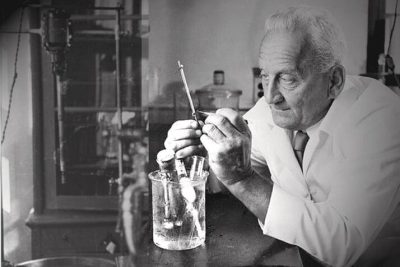130 years ago, in 1893, the Hungarian doctor and researcher who won the Nobel Prize for the discovery of vitamin C was born in Budapest. He is, who first extracted this vitamin, which is essential for the body, from paprika.
Legend has it that Szent-Györgyi, our most famous biochemist, did not like paprika at all, yet this vegetable brought him world fame. His wife always packed a pepper for her snacks, but the scientist, instead of eating it, began to examine it and found a very valuable substance.

However, in reality, the story turned out a little differently. Szent-Györgyi did a lot of research abroad in the 1920s and once found some unknown substance in his adrenal gland. Returning home from his trip to Szeged, he searched for a plant from which this substance could be extracted in larger quantities. Paprika turned out to be the perfect choice for this, as it extracted 6.5 grams of acid from 10 liters of juice. Later – at the same time as another researcher – he named this acid vitamin C and gave it the name ascorbic acid, referring to scurvy. Thanks to his discovery, it became possible to produce ascorbic acid in large quantities.
The scientist was already nominated for the Nobel Prize in 1934, but he did not receive it until 1937. The greatness and modesty of the biochemist is proved by the fact that he offered the coin to the Finns during the Soviet-Finnish war. Later, a wealthy Finn bought it and donated it to the Hungarian National Museum. The humble scientist commented on the award as follows:
“As a citizen, I never did more than what I considered my duty. And as a researcher, I never did anything other than satisfy my own curiosity. What makes this diploma doubly valuable to me is that I received this award at my own university and in my own country.”
Incidentally, Szent-Györgyi started studying muscle movement in Szeged and achieved many results in this field as well. The II. In World War II, he even took on a political role: he contributed to the preparations for exiting the war. After the war, he found a home in the USA, where he began to study the working principles of malignant tumors and cancer cells.
VITAMIN C
With the cold weather, the period of cold diseases also begins. Fortunately, we can still find plenty of fresh goods in the markets, with which it is recommended to supplement and tune up our vitamin stores if we want to maintain our health even in damp weather. However, we must also not forget that the coronavirus epidemic has not disappeared from our everyday lives, so many people do not like to leave home, if it is not vital, so we can get the necessary vitamins into our bodies not only in the form of fresh vegetables and fruits, but also in the form of nutritional supplements. In cold weather, we tend to eat more fatty foods that are poor in vitamins. In addition, we get less sunlight, so we have to pay more attention to replenishing essential vitamins and trace elements.
Among the vitamins that contribute to the proper functioning of the immune system, vitamin C is the first thing that most people think of. Vitamin C, as one of the well-known antioxidants, protects the cells of our body from oxidative damage caused by free radicals. Vitamin C also increases the production of white blood cells, which help fight off attacks induced by viruses and bacteria. It is good to know that many fruits (e.g. citrus fruits) and vegetables (e.g. peppers) are a delicious and unadulterated source of vitamin C.
THE NEED FOR VITAMIN C
Why does our body need vitamin C? Among other things, this vitamin contributes to the normal functioning of our immune system, to optimal collagen production and thus to the maintenance of the skin, teeth and gums, bones and cartilage, as well as the normal condition and functioning of blood vessels, to the maintenance of normal psychological function, reduces fatigue and the feeling of fatigue, supports the normal functioning of the nervous system, and research supports its role in preventing cancer and supporting healing.
The question may arise as to what amount of the vitamin, which is so important in maintaining our health, should be available to the human body every day. Is it possible to overdose on vitamin C? The recommended amount of vitamin C intake in Hungary is 90 mg/day, which can be provided very easily for our body with a balanced diet. In professional circles, the acceptable maximum intake amounts to a maximum of 2,000 mg per day. Vitamin C overdose through nutrition is actually excluded, and due to the differences in their absorption, it is also recommended to vote for vitamins C from natural sources. If our body is healthy, we have no hidden congenital kidney problems and we drink an adequate amount of water, vitamin C cannot be overdosed even by nutritional supplements.
